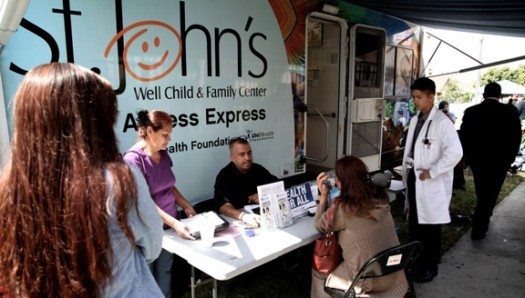

Who says debating the need for a living wage is like talking to a brick wall? The recent experience of one health care provider and its employees shows how respectful and reasonable such discussions can be.
Tomorrow (Thursday, March 13), a pivotal agreement between labor and management will be announced that offers hope for the living wage movement. St. John’s Well Child and Family Center, a nonprofit network of community health centers, and Service Employees International Union (SEIU) 721 will unveil a new collective bargaining agreement that will result in the centers’ front-line health care employees receiving a $15 hourly living wage. The contract was unanimously ratified by rank and file members March 3.
St. John’s provides health services at 10 centers and clinics throughout Central and South Los Angeles. Its president and CEO, Jim Mangia, issued a statement that said, in part, “We put forward the proposal for a living wage because we want our health centers to be the best places to give and to receive care.
» Read more about: Health Care Network Signs Living Wage Pact with Union »
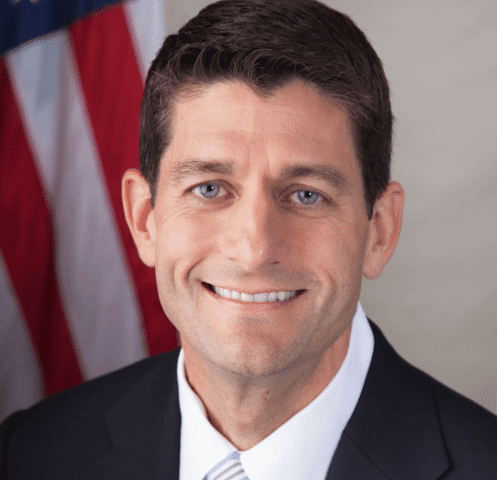

It is a sign of how far right the Republican Party has moved that New York Times columnist Ross Douthat describes Rep. Paul Ryan as a “moderate.”
In his column on Sunday, “Four Factions, No Favorite,” Douthat looked at the likely candidates for the 2016 Republican presidential nomination. Drawing on an article by Henry Olsen in the conservative journal National Interest, Douthat divides the GOP core voters into four groups: centrist (“think John McCain’s 2000 supporters or Jon Huntsman’s rather smaller 2012 support”), moderately conservative (“think the typical Mitt Romney or Bob Dole voter”), socially conservative (“think Mike Huckabee or Rick Santorum backers”) and very conservative but more secular (“think Gingrich voters last time or Steve Forbes voters much further back”).
Reviewing the stellar cast of likely GOP wannabes for 2016 (Chris Christie, Ted Cruz, Scott Walker,


The conventional wisdom of capitalism is encapsulated in the phrase “trickle down.” This means the money that some very rich people have accumulated gets invested in ways that create jobs, and the money dribbles down the social pyramid, first to administrators, then white collar managers and bureaucrats, then to the assembly line or shop floor workers, then to the janitors. General Motors used to be the quintessential capitalist corporation. “What was good for General Motors,” it was believed during the Eisenhower years, “was good for the country.”
Then in the 1980s, an economist from USC sold Ronald Reagan on a re-constructed version of this model. He called it “supply side economics.” This notion claims that the more goods are available for people to buy, the more money will concentrate in the upper reaches of the rich, and somehow, this is good for the country. The Walton family heirs to the Walmart fortune are a good example of this business model.
» Read more about: Trickle Down Profits Don’t Raise Any Boats »


If you’ve ever had to remodel or make major repairs on your home, then you know hiring the right contractor and constant oversight is key to a job well done. After all, if anything goes wrong, it is your time, money, and home at risk.
The Newark Star-Ledger covered a new study by Rutgers University that illustrates exactly this point with government contracts. According to Overlooking Oversight: A Lack of Oversight in the Garden State is Placing New Jersey Residents and Assets at Risk, contracts in the Garden State are often executed without adequate oversight or with poor contract language lacking high performance standards and accountability.
This is a big deal because unlike home renovation contractors that affect our porches, government contractors affect services that profoundly shape people’s lives—lives such as the victims of Hurricane Sandy.
» Read more about: Jersey Study: Subcontracting for Trouble »


Graffiti
— East Berlin
There is a pen scratching across a wall.
It is a white wall inside a white church
inches away from faces, crowds, the tumult
of history, but right now, there is only a pen,
bumping along a wall, no meaning
except the rise and fall of this nib,
a needle from an outdated gramophone,
playing each ridge and trough,
a landscape of chalk and moon.[divider]
Pireeni Sundaralingam is co-editor of Indivisible: An Anthology of Contemporary South Asian American Poetry (University of Arkansas Press, 2010), which won both the PEN Oakland Josephine Miles National Book Award and the 2011 Northern California Book Award. Her own poetry has been published in journals such as Ploughshares, Prairie Schooner and The Progressive, anthologies by W.W. Norton,
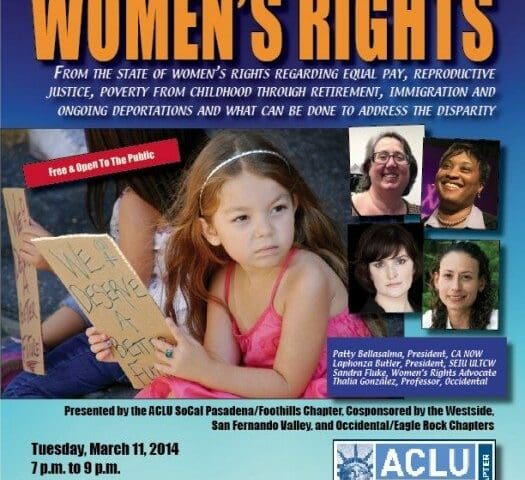

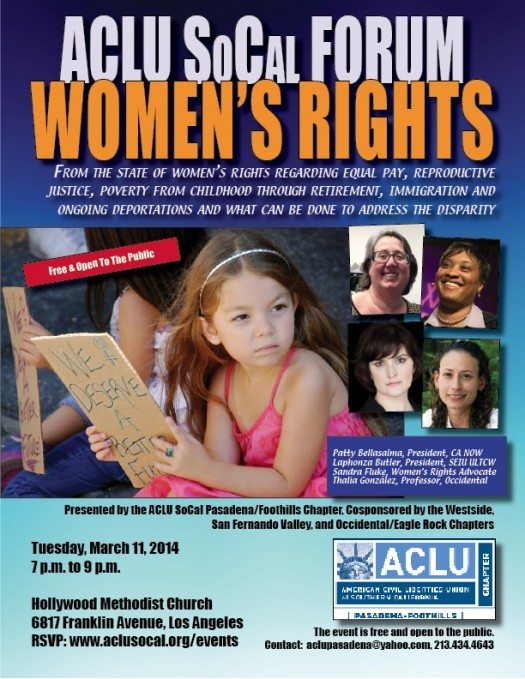 Tuesday’s bimonthly SoCal ACLU discussion forum will address the topic of women’s rights. Organized by the ACLU’s Pasadena/Foothills chapter, the event promises to be a much larger event than usual, prompting the chapter’s Sharon Kyle to announce its move to a bigger venue. Discussion topics will focus on women’s economic, political, social and legal rights, said Kyle, who publishes LA Progressive. Four guest speakers include the California president of the National Organization for Women, Patty Bellasalma; Service Employees International Union United Long Term Care Workers president Laphonza Butler; attorney and activist Sandra Fluke (who so angered Rush Limbaugh two years back), and Occidental College professor Thalia González.
Tuesday’s bimonthly SoCal ACLU discussion forum will address the topic of women’s rights. Organized by the ACLU’s Pasadena/Foothills chapter, the event promises to be a much larger event than usual, prompting the chapter’s Sharon Kyle to announce its move to a bigger venue. Discussion topics will focus on women’s economic, political, social and legal rights, said Kyle, who publishes LA Progressive. Four guest speakers include the California president of the National Organization for Women, Patty Bellasalma; Service Employees International Union United Long Term Care Workers president Laphonza Butler; attorney and activist Sandra Fluke (who so angered Rush Limbaugh two years back), and Occidental College professor Thalia González.
Kyle, who says that she and other black women haven’t always felt connected to the women’s movement, thinks this particular topic is ready for revisiting. For Kyle, the intersection of race and gender is central to the Women’s Rights Forum.
» Read more about: Laphonza Butler, Sandra Fluke Speak at Women’s Forum »
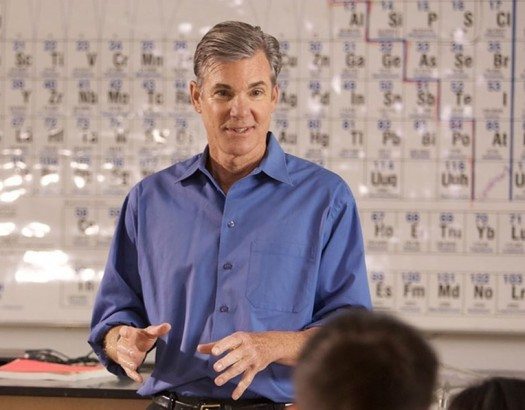

An election campaign now being fought almost completely out of public view could radically alter the way California’s school children are taught. If Marshall Tuck unseats incumbent Superintendent of Public Instruction Tom Torlakson, the state’s public education system could become a laboratory for a movement that prizes privatization and places a high value on student test scores over traditional instruction. The contrasts between the two top contenders in the nonpartisan race could not be more dramatic – nor could the stakes for the country’s largest education system.
The 40-year-old Tuck is a Harvard Business School graduate who has worked as an investment banker for Salomon Brothers and as an executive at Model N, a revenue-management software company. He is a former president of Green Dot Public Schools, a charter school operation in Los Angeles, and later served as the first head of the Partnership for Los Angeles Schools — former Mayor Antonio Villaraigosa’s controversial education nonprofit that tried to improve 17 low-performing public schools,
» Read more about: A Great Divide: The Election Fight for California’s Schools »


The following additional conversations have been lightly edited for clarity. For full article, see A Great Divide: The Election Fight for California’s Schools.
Doesn’t the academic performance of California students have a lot to do with being near the bottom of the state on money spent per pupils?
Definitely funding has to play a role . . . but it doesn’t play the only role. I can share this from pure experience because I’ve worked in schools where we had limited funding and had better results. Also, at some schools where we actually got more funding the results didn’t necessarily translate into great success.
How do you counter arguments that Mr Torlakson has more classroom experience than you?
I’ve spent the last 12 years working directly in education, working with kids and parents, working with teachers, hiring principals, developing principals,
» Read more about: Q&A Highlights for Marshall Tuck and Tom Torlakson »


 You may have heard that American Airlines is ending its policy of offering bereavement fares for passengers seeking last-minute tickets to attend family funerals. The announcement passed as do most news stories about the downsizing of American generosity – with a nostalgic whimper and corporate waiver. When CNN asked American Airlines the reason for the change, the company hid behind US Airways, the no-frills step-sister with which it had recently merged.
You may have heard that American Airlines is ending its policy of offering bereavement fares for passengers seeking last-minute tickets to attend family funerals. The announcement passed as do most news stories about the downsizing of American generosity – with a nostalgic whimper and corporate waiver. When CNN asked American Airlines the reason for the change, the company hid behind US Airways, the no-frills step-sister with which it had recently merged.
“In order to have a single, consistent program for American and US Airways,” read a canned statement, “we will adopt the US Airways policy and now offer customers the option to purchase changeable and refundable fares.”
In other words: US Airways made us do it! CNN didn’t ask American why it didn’t do the opposite and make US Airways adopt American Airline’s bereavement policy. Perhaps after more than a decade of beating contract concessions and givebacks from its unions,
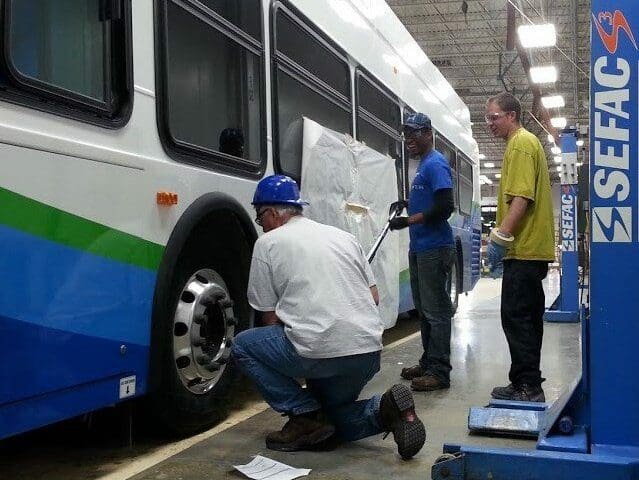

Minnesota is cold. When I visited the state in early February, surprisingly, the subzero temperatures weren’t the only reason for this impression. It was actually the sight of 122 acres of mangled metal above the Mississippi River that chilled me to the bone.
In St. Paul, a former Ford factory, which operated for more than 80 years and employed thousands of workers manufacturing cars, is being demolished. Seeing firsthand the historic Twin Cities Assembly Plant’s demise and the loss of so many quality, unionized American manufacturing jobs made me feel a keen sense of grief.
Ironically, I had come to Minnesota to encourage the creation of U.S. manufacturing jobs, by advocating that the Twin Cities regional planning agency, called the Metropolitan Council, leverage its purchases of buses and trains. I represented the Jobs to Move America coalition, which unites more than 30 community,
» Read more about: A Manufacturing Pulse Beat in the Heartland »


A man wearing the uniform and cap of a fast-food worker, his apron tucked into a pant pocket, approached a clerk at the Alameda County Social Service Agency. As he handed over documents for his public assistance benefits claim, the man explained how it had felt to be waiting in the lobby for the past several hours:
“I was the first here and the last to leave.”
“You should get a pay check!” the clerk responded.
The reality is that this man does “get a paycheck” from his minimum wage job, but finds himself unable to meet his basic needs. This is a common scene at my office in Oakland and public assistance offices across the country.
This month’s National Association of Social Workers’ theme is “All People Matter,” chosen to remind us of our profession’s commitment to improving social conditions for all.
» Read more about: ‘All People Matter’ — It’s Time to Raise the Minimum Wage »
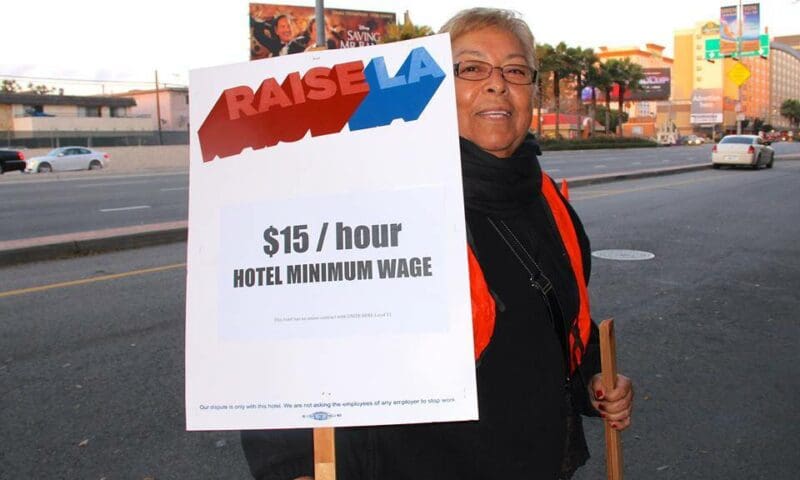
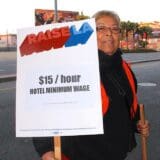
In an economy where constant, unpredictable change is a given, wages are one of the few things that have remained reliably stagnant. However, a growing national movement to address this increasingly visible issue is taking shape. Locally, Raise LA, a coalition of labor and community groups organized by the Los Angeles Alliance for a New Economy (LAANE), is part of a push to bring wages up to speed by advocating for better jobs in L.A.’s massive hospitality industry. According to a LAANE Raise LA report, “Residents, workers and businesses from communities across Los Angeles are united in the Raise LA Coalition in an effort to ensure that the city’s largest and most profitable hotels support the communities in which they operate.”
So why is Raise LA specifically focusing on hotels? One in 10 jobs in Los Angeles County is in the leisure and hospitality industry,
» Read more about: Raise LA Campaign Targets Hospitality Industry’s Low Wages »


The nomination of Californian Ted Mitchell to the number two position at the U.S. Department of Education is the latest indication that proponents of school privatization are continuing to gain influence over the Obama administration’s education policy.
“He represents the quintessence of the privatization movement,” Diane Ravitch, an education historian and former Assistant Secretary of Education under President George H.W. Bush, tells Capital & Main. “This is a signal the Obama administration is committed to moving forward aggressively with transferring public funds to private hands.”
In education “privatization” refers to the contracting out of traditional public education services to for-profit companies or to charter schools that are set up as nonprofit organizations. In many ways, the Mitchell nomination reflects the ongoing battle being fought in Washington and in school districts across the country. It’s a battle that pits the views of teachers, their unions and community groups against a movement that is backed by wealthy philanthropists and corporations.


The most difficult conversations for most activists happen with family. Particularly with parents or aunts and uncles, and cousins who disagree with a politically progressive perspective. My parents and I stopped talking about world events long before they died. I think that is a fairly normal behavior choice — just stop talking. When I visit with cousins who live in red states or the red parts of blue states, I almost always try to avoid any discussion that could lead to conflict. And I think they do too.
On the other hand, such difficult discussions are sometimes hard to avoid. Late last fall I received a screed forwarded by a cousin who lives in one of those red places on the map about an issue I thought had long gone the way of most such topical conflicts: the President’s birth certificate. I knew this was still a hot issue in some quarters during the President’s reelection,


Marina woke me up and told me the garage next door was on fire
I got off the couch and climbed on the brick wall with the hose
I pointed the hose at the neighbor’s smoking garage
Its walls emitted white light and exploded into sheets of flame
Marina did as I said and pounded on the window of the house, but
no one seemed to be home; those neighbors never said hello
I put water on their roof, which was starting to smoke as the garage
was wholly consumed, flames thirty feet in the air and even across
thirty or forty feet of concrete the roof of the house was catching fire
I yelled at Marina to tell someone to call the fire department, which
arrived and the house was saved
Marina only six or seven,


As the Vergara v. California trial ends its fourth week, the most conspicuous absence from the plaintiffs list may be that of the man most responsible for bringing the education lawsuit — David Welch, the 52-year-old Silicon Valley entrepreneur and founder of Students Matter. His Menlo Park-based nonprofit initiated Vergara and is picking up all of the plaintiffs’ attorneys and PR fees — a bill that was running nearly $3 million even before Welch’s high-powered legal team first set foot in Los Angeles Superior Court for the trial.
Vergara was filed on behalf of nine students and seeks to erase nearly a hundred years of teacher protections from the state education code that were adopted to prevent discriminatory and capricious terminations. The suit claims that five statutes addressing teacher dismissal, seniority and tenure disproportionately harm minority students in high-poverty schools by making it too difficult to fire incompetent teachers.
» Read more about: David Welch: The Man Behind Vergara v. California »


Are job protections for teachers to blame for educational underachievement among low-income students of color in California? That’s the provocative question ostensibly at the heart of Vergara vs. California, which seeks to invalidate the tenure, due process and seniority rights of hundreds of thousands of educators.
Astute observers of the nation’s escalating education wars, however, may be asking another question: When did it become permissible to use the welfare of children as a fig leaf for an all-out legal attack on teachers?
Or, as historian and teacher John Thompson wrote recently in Scholastic, “Are corporate reformers unabashedly using the courts as a battleground for battering employees’ rights, as opposed to helping children?”
Sadly, the answer to Thompson’s question appears to be an unequivocal yes. For while the outcome of Vergara will have far-reaching national implications, it is hardly unique in its attempt to scapegoat teachers for sub-par educational performance.
» Read more about: Vergara v. California’s Corporate Heart »
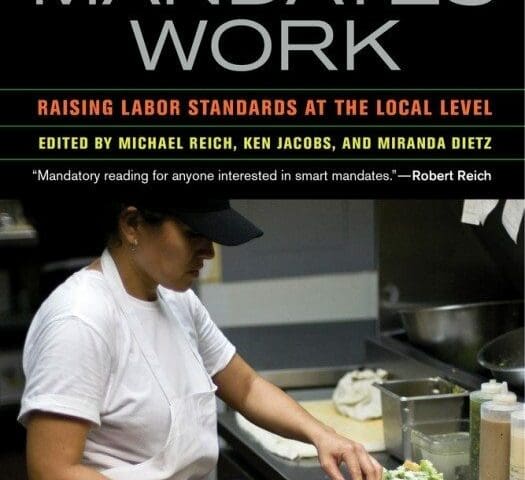
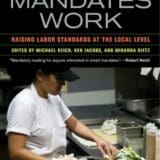
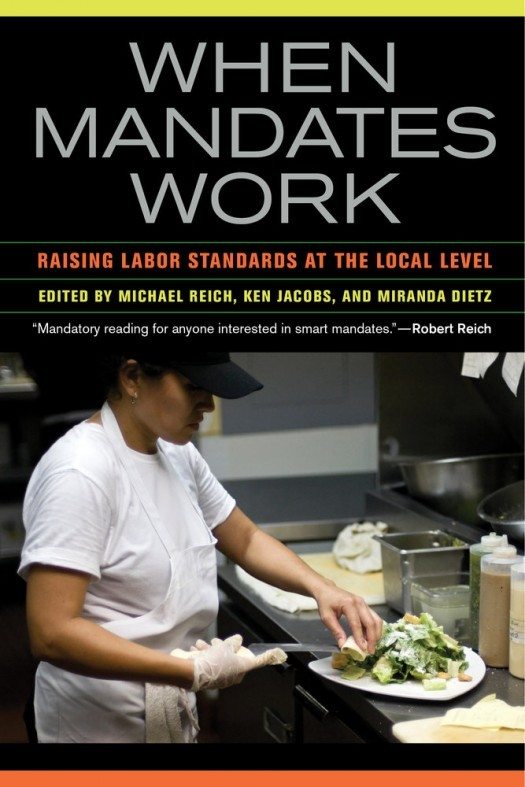 Forget, for the moment, downer news stories coming out of Midwestern statehouses, Southern auto plants and sundry federal courts. A new book edited and co-written by three Bay Area researchers optimistically chronicles what can be accomplished when progressive politicians and a determined electorate, backed by an energetic union movement, tackle income inequality, health care, labor peace and other challenges. When Mandates Work: Raising Labor Standards at the Local Level, edited by Michael Reich, Ken Jacobs and Miranda Dietz, parses a dozen years of legislation passed by San Francisco voters or their board of supervisors. Thanks to 10 ordinances enacted between 1996 and 2008 —
Forget, for the moment, downer news stories coming out of Midwestern statehouses, Southern auto plants and sundry federal courts. A new book edited and co-written by three Bay Area researchers optimistically chronicles what can be accomplished when progressive politicians and a determined electorate, backed by an energetic union movement, tackle income inequality, health care, labor peace and other challenges. When Mandates Work: Raising Labor Standards at the Local Level, edited by Michael Reich, Ken Jacobs and Miranda Dietz, parses a dozen years of legislation passed by San Francisco voters or their board of supervisors. Thanks to 10 ordinances enacted between 1996 and 2008 —
In an interview with Capital &
» Read more about: How San Francisco Created a New Social Compact: An Interview With Ken Jacobs »


After the President’s State of the Union address, federal policy circles are squarely focused on how to speed and grow America’s economic recovery. President Obama was right when he said America needs “a set of concrete, practical proposals to speed up growth, strengthen the middle class and build new ladders of opportunity.”
America’s public transportation infrastructure provides one excellent opportunity to build a more equitable, prosperous economy. Here are five policy prescriptions that can help create good jobs and growth in the transportation sector:
1. Make a globally competitive investment in infrastructure. Increase federal funding to address America’s infrastructure deficits identified by the American Society of Civil Engineers and detailed in the BlueGreen Alliance’s Repair America report, especially in the transportation sector. Investments in transportation can put Americans back to work while rebuilding our crumbling roads and bridges,
» Read more about: Five Policy Prescriptions for Transportation Job Creation and Growth »


 Last year Walmart commissioned a study on itself, and now its findings can be revealed: Walmart is the greatest thing since penicillin. More specifically, the study sees the chain-store titan’s widening footprint on America’s retail landscape as a gift for the communities lucky enough to have a Supercenter land on them.
Last year Walmart commissioned a study on itself, and now its findings can be revealed: Walmart is the greatest thing since penicillin. More specifically, the study sees the chain-store titan’s widening footprint on America’s retail landscape as a gift for the communities lucky enough to have a Supercenter land on them.
The research, conducted by the Hatamiya Group, a Davis-based firm owned by Lon Hatamiya, is predicated on a comparative analysis of taxable retail sales and retail business permits, and reaches two conclusions: “On average,” California communities with Walmart Supercenters in them have fared better economically than those without them.
Of course, while it may be difficult to name a community that doesn’t have a Walmart in it, California is a very large state and has places where even Walmart won’t tread – economic no-go zones that have been especially hard-hit by the recent recession and slow recovery.
» Read more about: Walmart’s New Research: A Flattering Self-Portrait »